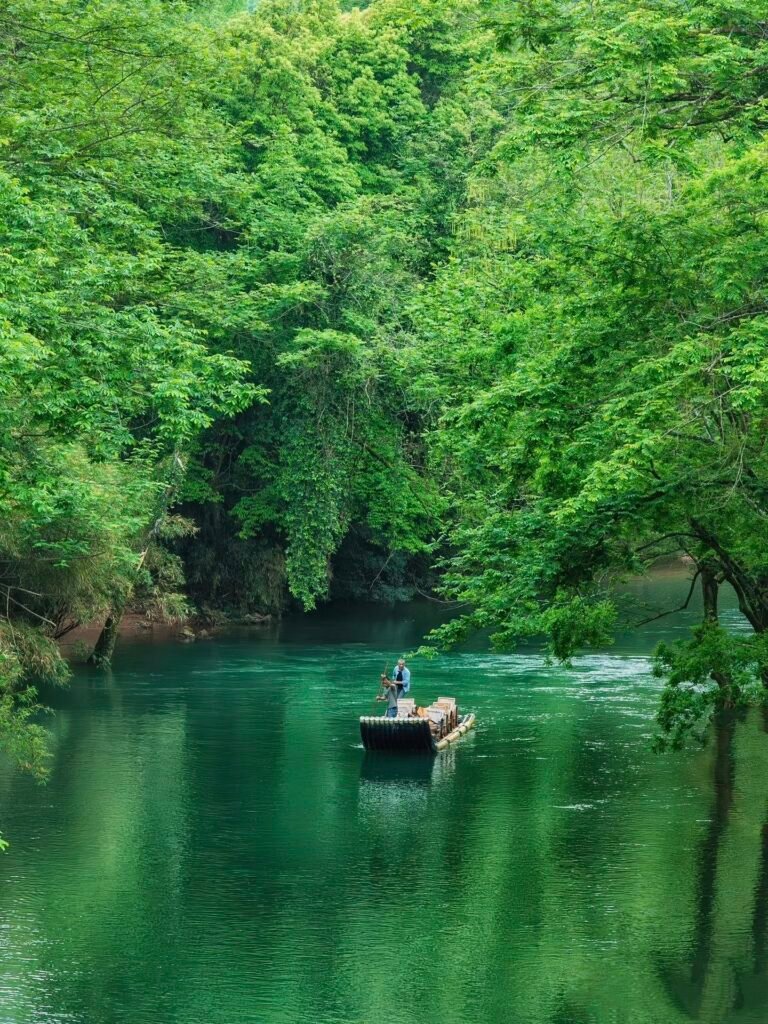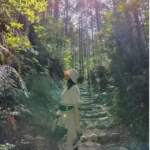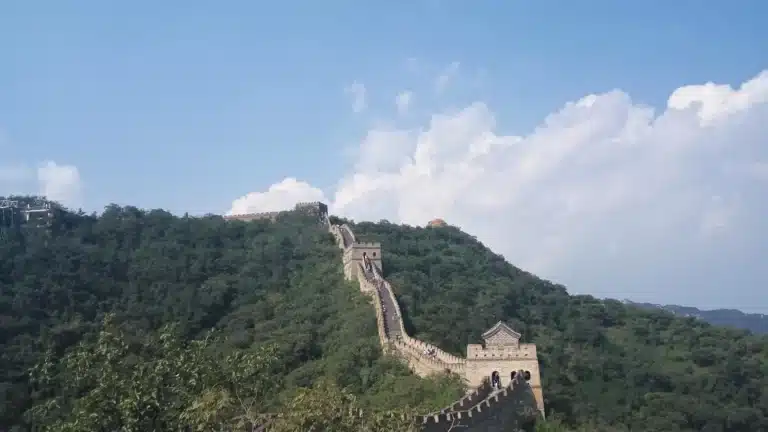UNESCO Wuyi Mountains China Travel Guide: 3-Day Nature Retreat
In Search of Serenity: A Three-Day Healing Retreat in Wuyi Mountains China
Listening to the whispers of mountains and rivers, far from the urban din

In October, Wuyi mountains lies veiled in mist, like a living ink painting that flows with every breeze. When the chaos of city life and endless to-do lists begin to suffocate us, this UNESCO World Cultural and Natural Heritage site becomes a sanctuary—a quiet refuge for the soul. Lonely Planet once named it one of the happiest places on Earth. After these three days, I finally understood the weight of that praise.
The three of us departed from Shanghai. To be honest, the looming crowds of the National Day holiday had us on the verge of canceling. A pointless argument nearly convinced me to stay behind. But thanks to one friend’s gentle mediation, we boarded that train. Looking back now, those disagreements feel so small, almost silly.
“Every breath in wuyi mountains china is a conversation with nature.”
Day One: Embracing the Danxia Landscapes
After a three-hour high-speed train ride, we transferred at Nanping to the local light rail bound for wuyi mountains china. Oddly enough, the long journey didn’t tire us out. Instead, as the train wound through lush mountains, I could almost feel the tension of the city slowly peeling away from my skin.
Ironically, just as I was soaking in the scenery, my friend was still on a video call with a client.
“Look at that view—are your work emails really that urgent?” I teased.
Qing looked up from her screen, glanced out the window, and gave a tired smile. “Five more minutes,” she said.
At the station, all our frustration melted away.
Heavenly Tour Peak: 848 Steps into the Clouds
After lunch, we headed straight for the wuyi mountains china scenic area. First stop? Heavenly Tour Peak (Tianyoufeng).
At the foot of the mountain, Fang looked up at the steep stairs. “We’re really climbing that?” she asked.
“They say the view is amazing,” I smiled. “You’re not giving up already, are you?”
The climb was hard. Every hundred steps, we stopped for a break. But these breaks became special moments. We shared snacks and water, and exchanged smiles with strangers climbing beside us.
“Step 313!” Qing cheered, pointing at a small number etched on the rock.
An older lady passed us and smiled. “Keep going. The view is worth every drop of sweat,” she said.
By step 656, Fang’s face was bright red. “I think my legs are going numb,” she groaned.
“We’ve done most of it,” I told her, handing over water. “Think of the cloud sea at the top.”
848 Steps to the Top: A View That Changes Everything
At the 848th step, I finally stood at the summit, breathing hard. Below, the mountains stretched like ocean waves—layer after layer, like a 3D ink painting.
My old worries suddenly felt small.
Qing grabbed my hand. Her eyes sparkled with tears.
“This was worth it,” she whispered.
“At the top of Tianyou Peak, what filled my heart wasn’t pride—it was a deep respect and thankfulness for nature.”
Tiger Roar Rock and One Thread of Sky
After coming down the mountain, we went to Tiger Roar Rock. Compared to Tianyou Peak, it was easier to walk, but the view was just as amazing.
The most unforgettable part was One Thread of Sky—a narrow passage between two huge rock walls, with only a thin slice of sky above.
Standing in that space felt a little scary but also full of wonder. Nature had carved this space so perfectly.
We are so small, yet nature allows us to walk through its masterpieces. It was humbling, and beautiful.
Impression Da Hong Pao Performance
That night, we watched the “Impression Da Hong Pao” show, directed by Zhang Yimou. With hundreds of performers, lights, and music, the spirit of wuyi mountains china—its history, tea, and culture—came alive before our eyes.
“Look at the way the tea farmer moves,” Fang whispered. “Every small gesture shows the soul of tea.”
She knew tea well—she grew up near wuyi mountains china.
When an actor handed me a warm cup of tea, I felt something special. That cup held more than warmth—it carried centuries of tradition.
For a moment, we forgot time. We were just part of this story, soaking it in.
Day Two: Into the Mist, Reaching the Light
At 4:30 a.m., we got up in the dark to catch the sunrise at Baiyun Temple.
We took a taxi and started walking with only our flashlights. The trail was rocky and steep. Rain the night before made it slippery. It was hard not to worry.
But every time I thought about turning back, the distant sound of temple bells gave me strength.
“I’ll lead with the flashlight,” I told my friends. “Just follow my light.”
“This path is so steep,” Fang said carefully. “Are we really going to make it?”
“Look over there,” Qing pointed. “Someone’s already halfway up. We can do this too!”
When we reached the temple platform, the sky was still dark. Some people had camped on the grass nearby.
The monks had already begun chanting. The sound echoed through the valley. It was peaceful, almost unreal.
We kept climbing. The top level was closed to the public, but we found a rope path nearby. When we saw someone even bring their dog up, we gathered our courage.
We held tight to the ropes and climbed.
At last, we stood at the top. A sea of clouds lay beneath us. The air was wet and cool. Each breath felt fresh, like we were being born again.
“wuyi mountains’ beauty isn’t just in the view—it’s in how it teaches us to slow down and find peace.”
Then the sun rose. Slowly, through the mist, a bright orange circle lit up the sky.
We stood in silence, holding each other close. No words were needed.
Zen Breakfast: A Quiet Meal at the Temple
Before going down, we had a quiet meal at the temple. A young monk greeted us and said softly,
“Please keep silence during the meal. Wash your bowls when finished.”
The meal followed Zen tradition—no talking. Everyone sat quietly, focused on their food.
No phones. No chatting. Only the soft sound of chopsticks. The simple vegetarian food had no strong spices. But it tasted pure and honest.
After eating, we washed our own dishes and returned them with care. Before leaving, we placed some money in the donation box.
It wasn’t just a meal. It felt like a quiet lesson in gratitude and respect.
Going Down: Making Peace with Time
We took a different path down. It was an old stone trail covered with moss, full of vintage charm.
We thought it would take 30–40 minutes. It took over an hour.
Normally, that would stress us out. But not today.
We kept stopping to take pictures, to breathe, to enjoy the moment.
Later, we almost missed our bamboo raft ride. I had to run ahead to hold our spot while the others caught up.
Even during a slow trip, the habit of rushing can sneak in.
Jiuqu Stream: Thoughts on a Bamboo Raft
Floating down the Jiuqu Stream is a must-do in wuyi mountains china.
Each bamboo raft has two rowers—one in front and one in back.
The rear rower also acts as a guide, telling funny stories and local history.
The ride lasted two hours. It was hot, but the breeze and cool water felt great.
Watching the scenery drift by, I felt something I couldn’t describe.
Sometimes, deep thoughts don’t need words. Just quiet moments.
Song Street and Zhizhi Temple: Walking Through Time
In the afternoon, we explored Song Street and Zhizhi Temple.
The old buildings made us feel like we had stepped back in time.
At Zhizhi Temple, we tasted real Wuyi rock tea.
“This Da Hong Pao tastes better than any I’ve had in Shanghai,” Qing said, eyes closed.
The tea master smiled.
“Wuyi rock tea is special because of the rocks.
The tea trees grow in stone cracks, taking in minerals from the earth.”
Every mountain tells a story. Every stream is a poem.
Wuyi mountains helps us find who we really are.
Day Three: A Quiet Goodbye
On our last day, we checked out early and headed to the train station.
Our trip was over.
But the calm and clarity wuyi mountains china gave us will stay with us, like the tea leaves we brought home.
Practical Info
Best Time to Visit: Fall (Sept–Nov) is cool and great for hiking. Summer (June–Aug) has lush views, cooler mountain temps, and amazing cloud seas. Avoid winter (Dec–Feb)—some places close, and fog is common.
Getting There:
- By Plane:
- Hong Kong → wuyi mountains china (~1.5h)
- Guangzhou → wuyi mountains china (~2h)
- By Train:
- Shanghai → wuyi mountains china (~3.5h)
- Xiamen → wuyi mountains china (~7h)
- Free light rail to scenic area (~30 min)
- Shuttle buses inside the park are included with ticket
- Driving or hiring a car is also convenient
Where to Stay:
- We stayed near Sangu Resort Area—good access, reasonable prices
- Guesthouses and tea farm stays inside the park offer a deeper nature experience
Must-See Spots:
- Baiyun Temple (sunrise + Zen meal) 🌟
- Tianyou Peak (panoramic view of Jiuqu Stream)
- Jiuqu Stream (bamboo rafting)
- Da Hong Pao Tea Garden (ancient tea trees, tea tasting)
- One Thread of Sky (narrow gorge)
- Yunu Peak (symbol of wuyi mountains china)
- Wuyi Palace (Taoist history)
- Water Curtain Cave (hidden waterfall)
- Tiger Roar Rock (bold, dramatic views)
Packing List:
- Good hiking shoes
- Flashlight (for early hikes)
- Lightweight rain jacket
- Refillable water bottle
- Snacks
- Light jacket (cool mornings/evenings)
- Hat & sunscreen
- Small first aid kit
- Lightweight camera
Tips:
- Bring flashlight for temple hike
- Temple meal is donation-based
- Book bamboo raft ahead—especially on holidays
- Choose a good seat for the Impression Da Hong Pao show for best tea experience
Reflections from the Train Ride Home
Staring out the window as the mountains faded, I thought about how small our fights were.
wuyi mountains china reminded me how to slow down, to listen, to make space for peace.
Maybe travel isn’t about escaping life—it’s about meeting ourselves again. Like that bamboo raft, maybe all we need is to go with the flow.
Wuyi mountains is now part of me. I can close my eyes and hear the stream, feel the sunrise, smell the tea.
And that, to me, is the meaning of travel.
Coming Soon: Wuyi Mountains China for Foodies 🍜🍵 If you liked this story, don’t miss my next post: “Tastes of wuyi mountains China: From Da Hong Pao to Fujian Street Snacks.” I’ll share everything we ate, drank, and loved in this tea-filled land.

TravelWishlists – Chelsea



